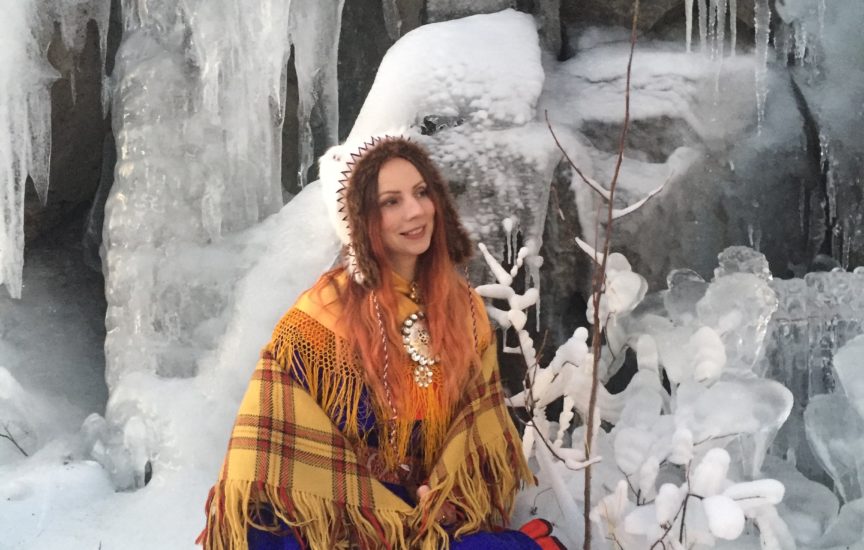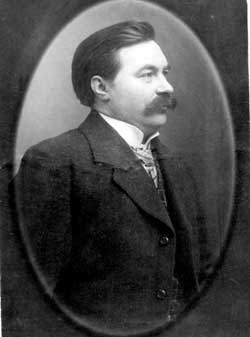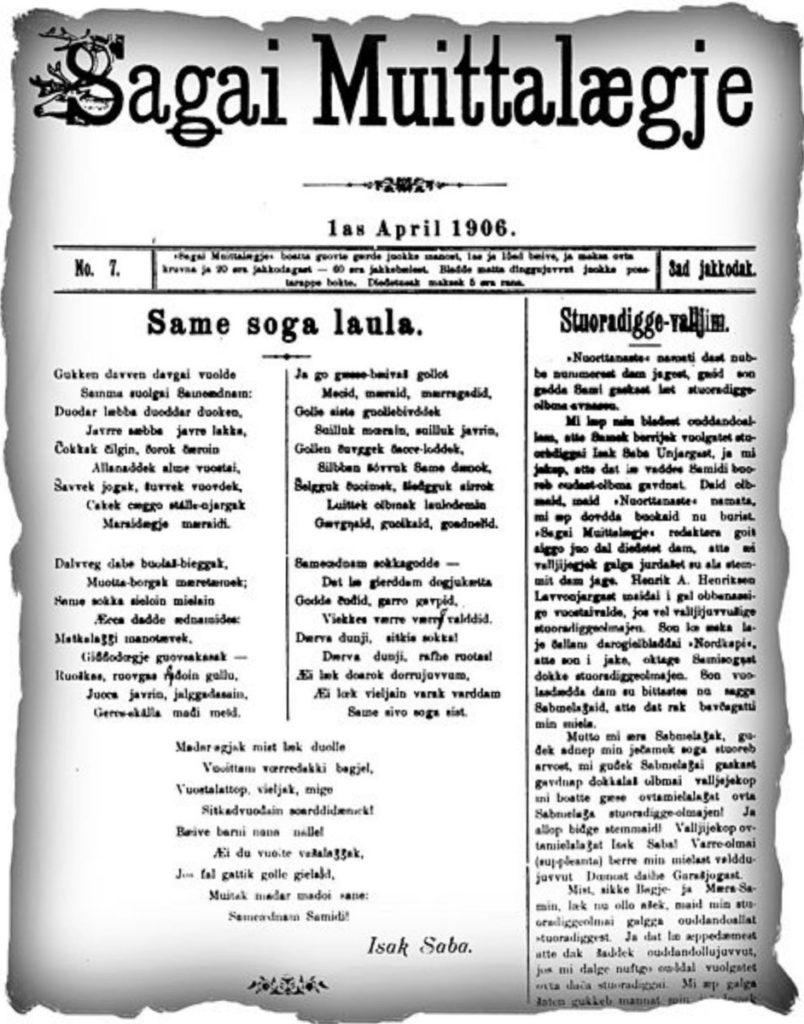SAMI SOGA LÁVLLA – THE SAMI ANTHEM

 You are Reading..
You are Reading..
SAMI SOGA LÁVLLA – THE SAMI ANTHEM
The lyrics to the Sami Anthem is the poem Sámi soga lávlla written by Isak Saba. He was a Norwegian school teacher and a researcher of Sami folklore and politics from Unjárga, Norway. The poem was first published on April 1, 1906 on the Northern Sami language in the Sámi newspaper Sagai Muittalægje. The same year he became the first Sami to be elected to the Norwegian Parliament (he was a deputy in 1906-1912).

Read about the Sami languages here.
In August 1986, the 13th Sámi Conference, was held in the Swedish village of Åre, the poem Sámi soga lávlla was declared the national anthem of the Sami. The music written for these words were by the Norwegian composer Arne Sørli, was approved in 1992 as the official national anthem at the 15th Sámi Conference in Helsinki. There is also a traditional joik-melody that has been used to this song.
This song is used as an National anthem for all Samis, no matter which country they live in. Same goes for the Sami Flag.
Messages of the song
There has been discussions of the last sentence in this song; “Sámieatnan Sámiide” – “The Saamiland for the Saami!“. This for many has been interpreted as a nationalistic demand or wish, seen from todays perspective. Harald Gaski (Sami writer and literary researcher) has stated that even some Samis dont want to sing this song because of the last sentence. But I think also that we have to remember the context in which this song is written.
Harald Gaski states that
the message in this song is to raise awareness of the Sami people. That is why the song is full of allusions to Sami myths and the old epic joiks that tell how the Sami people found the land that was meant for them.
The son of the Sun
In his call for continued Sami self-awareness and pride over our own cultural background, Isak Saba chose to point to a mythical past that explains the Sami origin back to the sun. Of the sun, the Sami got the wild reindeer that the women later tamed. The son of the Sun found his bride in the land of the jiehtanas, sprites. Together they got Gállábártnit, who were famous moose hunters, and also those who invented the skis. So never to be forgotten they were elevated to heaven after their death, where they today constitute the constellation Orion’s belt (which is in Sami called Gállábártnit).
These mythical people are the Sámi descendants of, and it should therefore be obvious that enemies never manage to overcome “Beaivvi bártni nana nálli” (the strong kin of the son of the sun) if the Sami only take care of their mother tongue and remember the words of their ancestors to us: “The Saamiland for the Saami!”
Saba had in a previous issue of Sagai Muittalægje told about how impressed he had been with the mythical stories of the Sami people’s proud past, which he had become acquainted with through the Finnish researcher Otto Donner’s book Lappalaisia lauluja from 1876.

Fight against forced assimilation
In the article, Saba promises that he will contribute to that the mythical stories never will be forgotten. Therefore, he advocates writing a national anthem in line with the tradition of national anthems, which mentions former grandeur while pointing forward by continuing to promise the people and culture existence, through pride over their own background and belonging. This is the main reason for the last line of the Sami people’s song, not primarily a desire to comment on the later debate on the right to land and water. But as any important work of art, this text is also timeless, in the sense that every age of course is in its full right to read in new interpretations and meanings in the text.
For Saba, however, it was imperative to fight against the forced assimilation that was official Norwegian/Swedish/Finnish/Russian politics at the beginning of the 20th century, where the aim of the education was to destroy Sami language and culture.
Like the shaman representing the Sami voice in Fellman’s text “The Thief and the Shaman”, Saba wants to urge his Sami brothers and sisters to actively resist the assimilation policy, not least by insisting on the importance of preserving their own language!
In Saba’s eyes, losing Sami language meant cultural deprivation – a point of view that probably still has great sympathy among the majority of those who, for the full throat, today also endorse especially the latest strokes of “Sámi soga lávlla”.
Source: Article in Norwegian here
Also read: The Sami Flag
Elins version of the song
In 2014 – I had deeply been longing back home to Sápmi for many years. I got a taste of the national-romatic feeling and wanted to sing this song. So I made my own very intimate version of the song with all the focus on the lyrics. Growing up, singing this song in elementary shcool it was so full of strange old-fashioend words I didn´t understand much of, and also we only sang the first and last verse, because it was too difficult for us. But when I read the lyrics (there are a few northern- sami versions of the lyrics), and looked up every word I didnt know in the dictionary, I realised how beautifully this song was written. For me it was like Isak Saba was writing about everything I was longing for and feeling at the moments when I was longing home. And it felt very right for me to make this version of the song. Here it is:
Here is an live version of the Sami anthem from 2017
And here is the “classic” version of Sami Anthem
SÁMI SOGA LÁVLLA
Guhkkin davvin Dávggáid vuolde
sabmá suolggaid Sámieatnan.
Duottar leabbá duoddar duohkin,
jávri seabbá jávrri lahka.
Čohkat čilggiin, čorut čearuin
allánaddet almmi vuostái.
Šávvet jogat, šuvvet vuovddit,
cáhket ceakko stállenjárggat
máraideaddji mearaide.
Dálvit dáppe buolašbiekkat,
muohtaborggat meariheamit.
Sámesohka sieluin mielain
eahccá datte eatnamiiddis:
Mátkkálažžii mánoheabit,
giđđudeaddji guovssahasat, –
ruoškkas, ruovggas rođuin gullo,
juhca jávrriin, jalgadasain,
geresskálla máđiid miel.
Ja go geassebeaivváš gollut
mehciid, mearaid, mearragáttiid,
golli siste guollebivdit
suilot mearain, suilot jávrriin.
Gollin čuvget čáhcelottit,
silban šovvot sámedeanut,
šelgot čuoimmit, šleđgot áirrut,
luitet albmát lávllodemiin
geavgŋáid, guoikkaid, goatniliid.
Sámeeatnan sohkagoddi
dat leat gierdan doddjokeahttá
godde čuđiid, garrugávppiid,
viehkes vearre-vearroválddiid.
Dearvva dutnje, sitkes sohka!
Dearvva dutnje, ráfi ruohtas!
Eai leat doarut dorrojuvvon,
eai leat vieljain varat vardán
sámi siivo soga sis.
Máttarádját mis leat dovle
vuoitán vearredahkkiid badjel.
Vuostálastot, vieljat, miige
sitkatvuođain soardiideamet!
Beaivvi bártniid nana nálli!
Eai du vuoitte vašálaččat,
jos fal gáhttet gollegielat,
muittát máttarmáttuid sáni:
Sámieatnan sámiide!
LYRICS IN ENGLISH –
Translated byRagnar Müller-Wille and Rauna Kuokkanen
1. Far up North ‘neath Ursa Major
Gently rises Saamiland.
Mountain upon mountain.
Lake upon lake.
Peaks, ridges and plateaus
Rising up to the skies.
Gurgling rivers, sighing forests.
Iron capes pointing sharp
Out towards the stormy sea.
2. Winter time with storm and cold
Fierce blizzards.
Saami kin, with hearts and souls
Their lands do love.
Moonlight for the traveller,
Living Aurora flickering,
Grunt of reindeer heard in groves of birch,
Voices over lakes and open grounds,
Swish of sled on winter road.
3. Summer’s sun casts golden hues
On forests, seas and shores.
Fishermen in gold, swaying
With the golden seas, golden lakes.
Silver Saami rivers gurgling
’round sparkling poles, shining oars.
Singing, men float down
Rapids, great and small,
And waters calm.
4. Saamiland’s people
With unbending strength
Defeated killing enemies, bad trades,
Sly and evil thieves.
Hail thee, tough Saami kin!
Hail thee, root of freedom!
Never was there battle,
Never brother’s blood was spilt
Amongst the peaceful Saami kin.
5. Our ancestors long ago
Trouble makers did defeat.
Let us, brothers, also resist
Staunchly our oppressors.
Oh, tough kin of the sun’s sons,
Never shall you be subdued
If you heed your golden Saami tongue,
Remember the ancestors’ word.
The Saamiland for the Saami!
Sources 05.02.2019
Alot of this post is translated to English from this article: https://www.nrk.no/sapmi/hva-betyr-sameland-for-samene_-1.6462879
All translations of Sami Soga Lávlla here: https://en.wikipedia.org/wiki/Sámi_anthem
ALSO READ: Sami languages The Sami Flag
